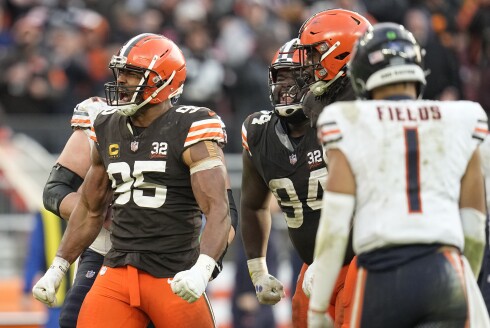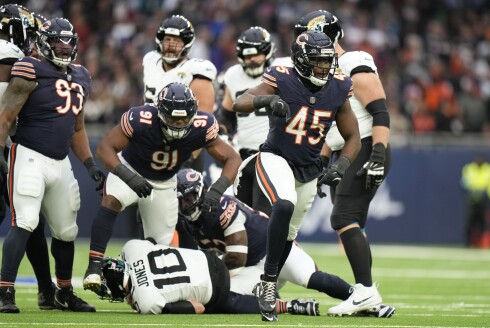Bears quarterback Caleb Williams can’t explain why he senses defenders rushing from his blind side and, at the last second, can pirouette away. He can “feel a little color” of the opposing jersey or his tackle turning his hips as though he’s been beat. But he admits he relies more on feel than facts.
“Maybe a sixth sense kind of thing,” he said.
Bears offensive coordinator Declan Doyle believes that at least part of Williams’ knack for escaping is God-given. As stoic as he can be on game days, head coach Ben Johnson can’t help but marvel at what he calls Williams’ Houdini acts.
“I’m thinking, ‘I’m the best coach in America,’ ” Johnson joked. “I mean, ‘That’s a hell of a play call, wasn’t it?’ ”
It would be easy to leave it at that — that Williams simply has the sensory skills to feel pass-rushers bearing down on him, and the athleticism to slip away.
Except that hasn’t always been the case. A year ago at this time, he was a sitting duck.
Through 10 weeks in 2024, Williams was sacked a league-high 38 times. He lost 259 yards, second-most in the NFL. The offense was so broken that the Bears fired coordinator Shane Waldron in the middle of Week 11.
Through 10 weeks this season, Williams has been sacked just 14 times — 30th in the NFL. His loss of 93 yards ranks 28th.
In the last four weeks, he has been sacked just four times. The Patriots’ Drake Maye, a fellow second-year quarterback, has been sacked the most in that span — 17 times.
“It’s huge,” Williams said. “Part of it is the guys I’ve got up front. They’ve been awesome for me and for us. . . . Then, the other half of it is, I think, Coach’s emphasis on me getting the ball out.”
Since his arrival in January, Johnson has prioritized protecting Williams. General manager Ryan Poles has, too, signing center Drew Dalman and trading for guards Joe Thuney and Jonah Jackson, who count a combined $35 million against this year’s salary cap.
No team will test the Bears’ protection plan more than their opponent Sunday, the Vikings, who blitz 42.2% of the time, the most in the league. Percentage-wise, they also rank in the top five in the NFL in quarterback hurries, knockdowns and pressures.
They only have 24 sacks, though — 12th in the league.
Williams, however, has handled the Vikings’ pressure well. He averages 2.3 sacks in games against them but 3.3 in every other game. Perhaps that’s why the Vikings blitzed less than the Bears believed they would in Week 1.
“For those types of situations where you expect them to do something when you’re going into a game plan … it’s kudos to them for being able to completely change it up,” Williams said. “I’m expecting that [defensive coordinator Brian Flores] will have a bunch of different wrinkles, and we’ve got to adjust to those in those games.”
Flores, who interviewed for the Bears’ head-coaching job last winter, reminds Johnson of Bill Belichick in that regard — not afraid to morph his strategy from week to week.
“It does create issues as you’re trying to game-plan,” Johnson said, “because you want to make sure you’re sound, you make sure you’ve got guys accounted for, and yet, if you do too much, you run the risk of guys thinking too much and they start playing slow. And the defense feasts on you that way, too.”
Unlike in Week 1, the Bears now know what they can rely on to keep Williams upright. It starts with a strong running game — only the Bills average more rushing yards per game than the Bears’ 147.3.
“When a defense has respect for stopping your run game, then it certainly slows them down, and they’re transitioning to the pass rush,” Johnson said. “I think it always starts there, but there’s no mistaking what Caleb can do. He just feels it. The way he evades, I think it’s second to none.”
Williams is only getting more confident scrambling the more he plays with this offensive line. The Bears’ five linemen will start their sixth consecutive game together Sunday, something the Bears haven’t been able to say since 2021.
“I think their offensive line is probably not being talked about enough,” Vikings coach Kevin O’Connell said.
In some ways, escaping is the easy part for Williams. The next step, Johnson said, is for him to feel the pressure, hang in the pocket and deliver the ball on time. That progression is natural for a second-year quarterback in the first year of a new system, he said.
“You don’t want to take away that natural instinct that he has,” Johnson said. “But yet there’s a little bit of, ‘Man, if we stay in here, I think this unlocks even more of your game, and we will have some more explosive plays, potentially.’ ”


